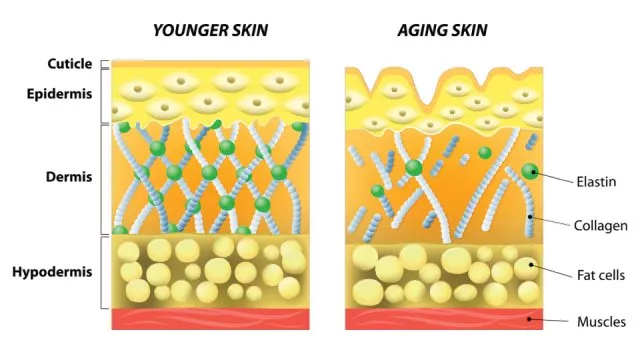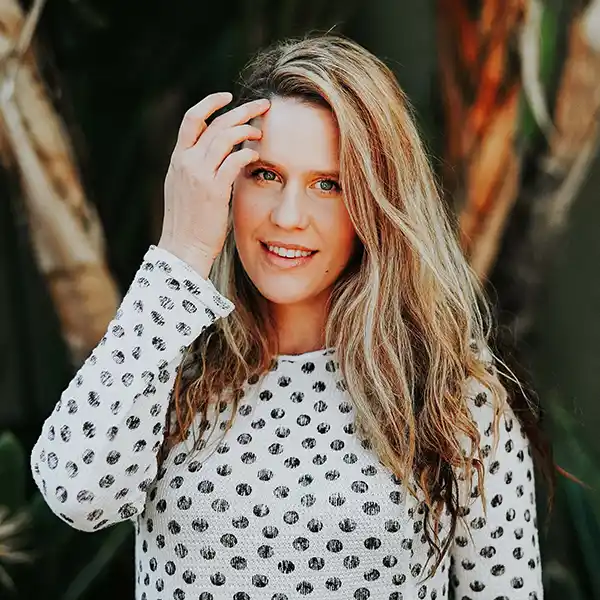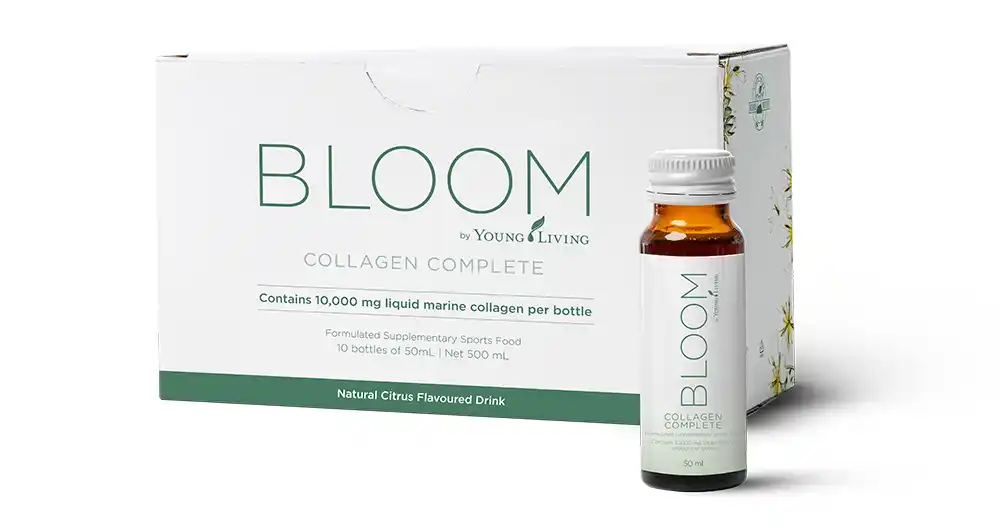Let’s be honest… Getting older sucks! Don’t get me wrong, there ARE some benefits to maturing, but, when it comes to the effects of ageing on our bodies… I’m NOT a big fan. Know what I mean? That’s why in this article I’m going to give you nine reasons why collagen can not just help you survive, but help you THRIVE as you get older. You’ll discover how collagen can turn back your body’s ageing clock so you FEEL younger, stronger and sexier, AND so your skin, hair and nails LOOK amazing.
If you’re a busy woman who is heading into perimenopause or menopause, then this article is for you! Here’s what you’re going to discover:
So, if you’re interested in finding out how collagen can make all the difference to your health, skin and wellbeing as you get older… read on!
Can you REALLY turn back time?

This year I turn 47 and I’m embracing the pro-aging movement. I’ve never had Botox or any work done. In fact, the only ‘work’ I’ve ever done on my face is to use natural skincare and makeup products*. And now, daily collagen.
*True confession – once I (bravely) let my best friend dye my eyebrows after a few drinks… let’s just say, it ended badly.
It turns out, Cher was right! You CAN turn back time – or at least reverse or slow some of the effects it has on your body. So, here’s everything you need to know about why taking a collagen supplement can make ALL the difference as you age:
1/ What IS collagen and why is it SO important to have enough?
The short version is collagen:
- Helps to revitalise skin suppleness.
- Helps to rejuvenate skin complexion.
- Helps to restore the natural radiance of skin.
- Helps to improve skin tone and smoothness.
- Helps to strengthen skin elasticity and firmness.
- Helps to support hair, nails and connective tissue health.
- Helps with tissue building and repair.
- Helps you sleep longer, better and more easily.
Collagen makes up 25 to 35% of your body’s protein content. Put simply, it’s the glue that holds everything together in your body.
There are three basic types of collagen. 90% of the collagen in your body is Type 1, which is exactly what you want as it’s the best collagen for your skin, nails, and hair.
Type 2 collagen works specifically to cushion your joints, and provides protection to your long bones and thigh bones (especially where they insert into the joint sockets).
Type 3 is the second most abundant collagen in your body. It’s found in bones, teeth, skin, connective tissue and tendons.
As you can see, collagen is super-important in our bodies, but there’s a problem…
2/ What happens to our collagen as we get older?
So, collagen is what holds us together and it’s the secret to your skin’s suppleness, tone, and elasticity.
Bear with me for a moment… Think of your skin’s outer layer (epidermis) as a shield. It protects you from UV radiation, harmful chemicals and infections. Beneath that, in the dermis, is where you’ll find your skin’s collagen fibres. These fibres are joined together by elastin (which keeps your skin smooth and supple) and hyaluronic acid (which traps moisture in your skin keeping your skin plump).
But here’s the problem: as you age, your existing collagen breaks down, and it gets harder for your body to produce more. The bad news is, starting from your 20s you are losing collagen every single day. By the time you’re 40, 30% of your body’s collagen has been lost and by age 50, a whopping 50% has said farewell! And that has a HUGE effect on your skin.
One of the main factors in your skin looking ‘older’ is the loss of collagen from the dermis. In fact, this takes place long before it becomes visible in the epidermis, and it’s what causes your skin to wrinkle and sag as you get older.

And don’t forget your hair – it’s made up of up to 90% protein, so collagen’s involved there too. As collagen production slows down your body starts to send it to more vital parts of your body which is why you hair becomes more brittle and loses its shine.
We notice the outward effects of collagen loss in our skin, hair and nails. But remember, collagen loss also has BIG effects inside your body on your bones, joints and organs.
3/ What can we do about collagen loss?
The good news is that there are two ways that we can help our body to maintain and produce collagen. And both are important and necessary as we get older.
To produce collagen, your body puts the amino acids glycine and proline together with other amino acids, vitamins and minerals, including vitamin C, zinc, and copper.
So, the first way you can help your body produce more collagen is by eating lots of glycine- and proline-rich foods like chicken, beef, fish, dairy, eggs, and beans. For vitamin C, zinc, and copper, you should also be sure to eat foods like citrus fruits, tomatoes, leafy greens, shellfish, nuts, and whole grains.
The second way to boost your collagen is to take a good collagen supplement. And by good, I mean one that does two things:
- It contains a significant amount of the right type of collagen.
- It can be easily absorbed and effectively used by your body (it’s bio-available).
Stay tuned, because further down I’ll tell you the best collagen supplement to take that gets a big tick in both those boxes.

4/ At what age should a woman start taking collagen?
The best age to start taking collagen is whatever your age is now!
As we’ve discovered, you can support your skin and slow down the natural ageing process by eating right and taking a collagen supplement.
Given the fact that your collagen production begins to slow in your 20’s (whose dumb idea was that???), taking a collagen supplement is recommended if you are:
- Aged 25 and above
- Love the sun and tanning
- Spend a lot of time on electronic devices, exposing your skin to blue light radiation
- A night bird, and love staying up late
- An athlete or a fitness fan
- A smoker or eat processed foods
Note: This isn’t a “take it one time and she’ll be right, mate” thing. Once you’ve hit the magical age of 25, it’s important to take collagen regularly to support a healthy, strong body and great skin.
Now, if (like me) you’re over 25 and this is the first you’ve heard of this, don’t panic!
The good news is it’s never too late to start…and you’ll see wonderful benefits to your skin by taking collagen, whatever your age.
5/ How does collagen help ease menopause symptoms?
Did you know that collagen production is linked to oestrogen levels in your body? Yep! So as we head into perimenopause and then menopause and our oestrogen levels decrease, so does our collagen production!
So, it’s no surprise that many of the negative effects that women ‘enjoy’ as we go through menopause – dry and sagging skin, loss of bone density, aching joints, hair thinning… are related to the loss of collagen.
The great news is that many studies have shown that taking a good collagen supplement can help reverse or ease these unwanted symptoms and smooth what can be a pretty bumpy journey.
For more about how to smooth your journey through perimenopause and menopause, check out my post here:
6/ Can collagen really help you sleep better?
Yes! One of the challenges many women going through menopause struggle with is sleep – getting to sleep, staying asleep and getting good quality sleep. It turns out that about 20% of collagen is a cheeky little amino acid called glycine. And guess what? Research shows that taking glycine about an hour before bed can help you fall asleep more easily, sleep longer and have more restful sleep.
So, when should you take your collagen supplement? That’s a no-brainer! About an hour before you’re heading off to bed is the ideal time to let the glycine in the collagen work its magic.
7/ How long does it take for collagen to work? Does taking collagen every day really work?
I’d love to tell you that collagen will make everything better instantly. And there are plenty of dodgy operators out there who will promise instant results. But, the bottom line is – like most worthwhile things in life, the change won’t happen overnight… but it WILL happen. The research (and there’s lots of it) shows that you’ll start to see significant benefits (smoother, more hydrated, less wrinkled skin) from taking collagen daily in about 4 – 12 weeks.
And remember – the collagen is doing good things for you from the inside out. Here’s a summary of what the research shows about when you’ll experience benefits from taking daily collagen supplements:
- Better, longer and easier sleep: immediately
- Skin support benefits: 4 to 12 weeks
- Nails support: 24 weeks
- Joint health support: 4 to 6 months
- Tendon support (combined with strengthening exercise): 3 to 6 months
- Bone-density support: 12 months
- Increased muscle mass and strength (combined with resistance training): 3 months
- Less soreness after physical training: within a few days
As I said earlier, this isn’t a ‘take it once and wake up the next morning 20 years younger’ miracle product. I think of it more as a lifestyle decision and an investment in a healthier, happier and less-wrinkled future!
8/ How much collagen should you take daily?
A review of clinical studies in 2019 showed that taking between 2.5 and 15 grams of hydrolized collagen peptides (I’ll explain what these are in a moment) is both safe and effective. In my experience, taking 10g daily of hydrolized marine collagen peptides, in combination with a healthy diet, is just right for me.
A quick explanation – by far the best way for your body to absorb collagen so it is most useable (bio-available) is when it is in the form of peptides. The hydrolization process breaks the collagen down into these smaller peptides making them easier for your body to absorb.
Why marine collagen?
The collagen is extracted from the skin and scales of fish – and the hydrolizing process removes the fish oil so there’s NO fishy taste left! The marine collagen peptides are smaller and more easily absorbed than peptides from other sources like beef or pork.
PLUS they’re also rich in the amino acid hydroxyproline which is an essential component of skin, blood vessel walls and connective tissues, so it has benefits for your whole body.
9/ What is the best collagen supplement to take?
The best collagen supplement to take is one that has plenty of collagen, in the most absorbable form, and it’s sourced ethically from a company you trust.
That’s why I only use and recommend Young Living’s BLOOM Collagen Complete. It ticks all the boxes:

- The 10g of hydrolised marine collagen peptides in every serve is ethically and sustainably sourced from the world’ leading collagen manufacturer in France. And their practices are certified by the Marine Conservation Alliance and Friends of the Sea.
- Young Living’s unique BLOOM recipe includes wolfberry extract, CoQ10, Jasmine tea extract and other skin- and wellness- supporting vitamins and minerals.
- BLOOM is supercharged with pure Young Living Grapefruit, Lemon and Lime essential oils, making it much more than ‘just a collagen supplement’. It’s a total wellness product.
- It tastes delicious!
- It works – I notice the difference it makes to me every day.

You now know who my new best friend is and why I love the Bloom by Young Living Collagen.
If you are ready to try the best Collagen supplement in Australia then click the link below. I order the 30 pack so it lasts me a whole month and saves me money. Best of all with any 30 pack of Bloom Collagen you get a free wholesale account with Young Living which saves you 24%.











 Subscribe to Hot Oily Mumma
Subscribe to Hot Oily Mumma